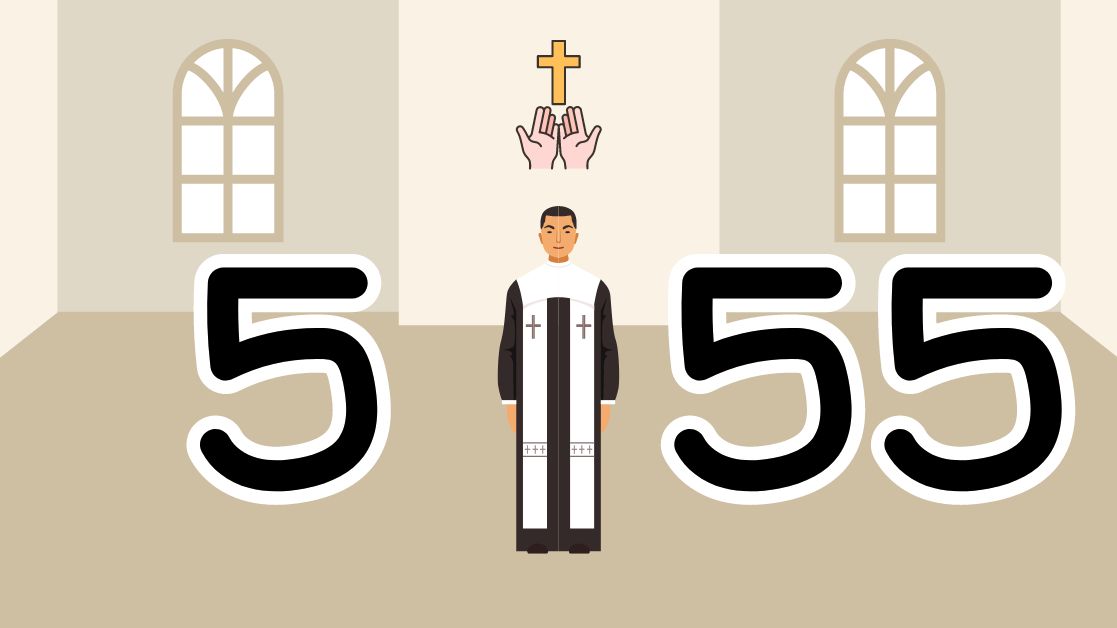The numerical sequence “555” is not explicitly mentioned within the pages of the Bible. Instead, the number that comes closest in occurrence is “500,” which is found multiple times. Likewise, the nearest proximity in terms of individual digits is “55”.
It’s important to note that references such as page numbers and verse citations like Isaiah 55:5 are not inherent to the original Biblical text. Given this context, the question arises: what is the true significance behind the number “555” in the Bible?
Occurrences of 500
The closest number to 555 explicitly mentioned in the Bible is 500. This number is mentioned several times in the Bible. Some of the significant narratives mentioning this number involve Noah and King Solomon.
In the story of Noah’s Ark, Noah was 500 years old when he began to build the Ark as instructed by God (Genesis 5:32). This connection highlights the significant role the number 500 played at the beginning of a new chapter in humanity’s history.
King Solomon, known for his wisdom, wealth, and construction projects, created a collection of 500 shields of gold to adorn the House of the Forest of Lebanon (1 Kings 10:16-17). These shields symbolized his reign’s grandeur and luxury, reflecting his affluence and desire to display his dominion.
While the number 500 might not have a consistent and explicit symbolic meaning throughout its occurrences in the Bible, it can be inferred that it represents moments of transition, preparation, and significant quantities. The instances mentioned above point to periods of change, selection, and abundance, where the number 500 is used as a numerical marker to emphasize these themes.
Number 55 in the Bible
Considering individual digits, the number 55 was mentioned in a few circumstances in the Bible. One of them is found in the book of Nehemiah, recounting the rebuilding of Jerusalem’s walls.
The chapter names involved in the restoration are inscribed in Nehemiah 3. Among them, the 55th name listed is the Nethinim, who were temple servants dedicated to serving God (Nehemiah 3:31). The positioning of this name could imply the importance of dedicated service within the context of restoration and renewal.
Instances of 555
The fifth book of the Bible, Deuteronomy, derives its name from the term “fifth book,” signifying its sequential position. Within its fifth chapter and fifth verse (555), a passage sheds light on Moses and his integral role in carrying out God’s divine plan.
In Deuteronomy 5:5, Holy Bible Faithful Version, Moses stood as an intermediary to the Lord. It was during this time he conveyed the word of the Lord.
The recurring occurrence of the number five in this verse (555) affirms Moses’ pivotal function as the intermediary within the Old Covenant arrangement between God and the Israelites. It further attests to his role as an intercessor, mirroring the archetype of Jesus, as also alluded to in 1 Corinthians 10:2.
Upon the completion of erecting God’s Tabernacle amidst the wilderness, Moses undertook the task of anointing and sanctifying the entire structure, including its altar, as recounted in Numbers 7:1. Subsequently, leaders from each of the twelve tribes of Israel took part in a significant event, wherein they bestowed offerings during the altar’s dedication.
In a gesture of profound reverence, every tribal chieftain contributed gifts, such as five rams, five male goats, and five male lambs (555). This assortment of offerings, outlined in Numbers 7:12 – 83, assumed the form of fellowship (or peace) offerings.
As delineated in Leviticus 3:1 – 17 and 7:11 – 36, these peace offerings symbolize gratitude for bestowed blessings and the communion shared with the divine. Importantly, those who presented these offerings were also granted the privilege of partaking in their meat.
A notable aspect is the commencement of these offerings by the tribe of Judah (Numbers 7:12 – 17), followed sequentially by Issachar, Zebulon, and so forth, culminating with Naphtali. This sequential order aligns precisely with the arrangement of Israel’s tribes around the Tabernacle within their encampment.
Other Biblical Meaning of 555
The Tetragrammaton, which refers to the four Hebrew consonants that represent God’s exact name in Scripture, appears 555 times in the book of Jeremiah.
Within the New Testament, a profound revelation unfolds within the confines of the fifth book, fifth chapter, and fifth verse (555), which underscores the gravity of God’s response to those who endeavor to deceive Him.
Upon hearing Peter’s censure regarding his deceitful actions towards the church, Ananias crumbled and perished. This event sparked profound trepidation among all those who witnessed Peter’s words (Acts 5:5).
Sapphira, Ananias’ spouse, who also played a role in the plot to dupe the early New Testament congregation, experienced a direct divine intervention resulting in her demise (Acts 5:9 – 10).
Bottom Line
While the number “555” may not be explicitly mentioned in the Bible, the threads of its significance are woven throughout various occurrences and contexts.
The interpretation of “555” is ultimately a reflective and contemplative process that can deepen one’s connection to faith and spirituality.
As with any aspect of biblical interpretation, an open heart, a seeking spirit, and a willingness to grow are essential in uncovering the hidden meanings behind the numbers.




